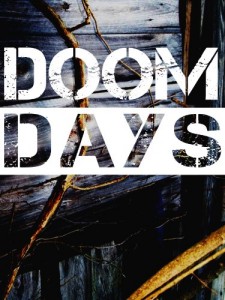review: Doom Days
¶ by Rob Friesel Doom Days is an anthology in the same spirit as Larry Niven’s The Man-Kzin Wars series or Robert Lynn Asprin’s Thieves’ World 1 — a “shared world” anthology conceived by one author, but the individual (and loosely-connected) stories written by several others besides. This particular set of stories is set in a post-apocalyptic United States 2 — specifically the fictional town of Thorn Creek, North Carolina, a bit outside of Raleigh. The nature of the apocalypse (“the Collapse”) is never really explored, and stories focus instead on the hard-scrabble lives of the characters scraping out their existence within the milieu. The stories are populated by a diverse cast of relatable, mostly “morally good” 3 protagonists against a largely invisible back-drop of scavengers, opportunists, bandits, slavers, and… intellectual terrorists? 4
Doom Days is an anthology in the same spirit as Larry Niven’s The Man-Kzin Wars series or Robert Lynn Asprin’s Thieves’ World 1 — a “shared world” anthology conceived by one author, but the individual (and loosely-connected) stories written by several others besides. This particular set of stories is set in a post-apocalyptic United States 2 — specifically the fictional town of Thorn Creek, North Carolina, a bit outside of Raleigh. The nature of the apocalypse (“the Collapse”) is never really explored, and stories focus instead on the hard-scrabble lives of the characters scraping out their existence within the milieu. The stories are populated by a diverse cast of relatable, mostly “morally good” 3 protagonists against a largely invisible back-drop of scavengers, opportunists, bandits, slavers, and… intellectual terrorists? 4
At their hearts, post-apocalyptic stories tend to be “what if?” fantasies that let the author(s) plant little utopian seeds in the midst of some of the most difficult and taxing periods they can imagine. (It’s convenient, really.) They’re fun to contemplate. “What if we got rid of all these modern trappings and went down to basics–would we wind up making the same mistakes?” They’re fables, morality plays. They’re easy because we get to have a simple-yet-familiar world in which to explore what feel like fundamental questions. But just because they’re easy doesn’t make them bad. They work. As Dale Bailey wrote: 5
The truth is, almost all end-of-the-world stories are at some level Adam-and-Eve stories.
And the Doom Days anthology is no different. 6
Overall, the stories are pretty good. “Grasshopper Song” alone makes the whole thing worth the $2.99 Kindle price.
- The former was the first one that came to mind for me; the latter was the one cited in the author’s note.[↩]
- No real discussion of whether this “Collapse” affects the rest of the world. It’s suggested that it does, but it’s also suggested that places like Canada and Mexico are somehow “safe(r)”. It doesn’t totally add up, but given its local focus and the somewhat specifically narrow scope of the story, I don’t think it matters that this isn’t explored.[↩]
- ”Morally good” being in the traditional Western more/less Judeo-Christian sense of the phrase here. Not Mega-Church Ultra-Right Family Values “Good”, but a more (Western) universally palatable good vis-Ã -vis hard work, fairness, justice, etc.[↩]
- Not exactly a spoiler alert here but… A couple of the stories refer to “the University” in rather ominous terms. The University appears to be a town/commune built up around an abandoned college campus in Raleigh, NC. The narrative paints The University’s inhabitants as an oligarchy of unscrupulous academics and engineers that have walled themselves off in this compound so that they can pursue a rigorous eugenics program while trying to fashion themselves into the post-apocalyptic world’s first nuclear power. I was really hoping that there would be more to this — that The University and the circumstances around it would be more nuanced… But instead it’s almost cartoonishly flat and carries a latent anti-intellectualism that was my biggest disappointment with the anthology.[↩]
- Citation: “The End of the World as We Know It” by Dale Bailey, as it appears in the John Joseph Adams anthology, Wastelands: Stories of the Apocalypse (2008).[↩]
- Hell, it starts with what is basically a twisted cast-out-of-Eden retelling.[↩]
Leave a Reply